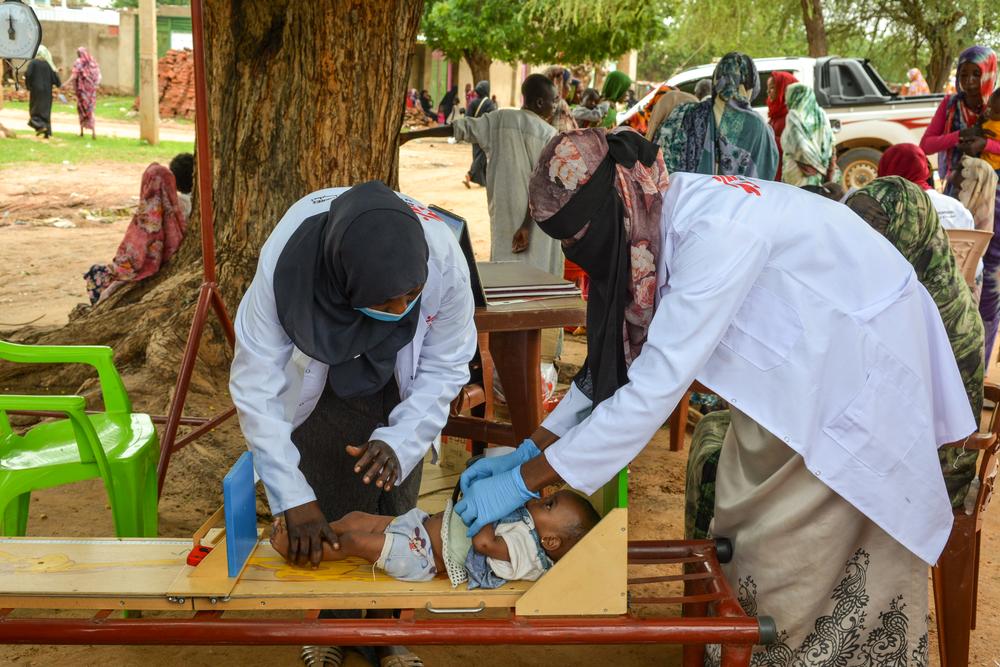“MSF has been working in Darfur for years and launched operations in Al-Geneina, the capital of West Darfur, in February 2021. Conflict in Darfur killed hundreds of thousands of people over a decade ago. While the scale of the violence has reduced, intercommunal violence still occasionally erupts.
In January and April, conflict killed over 150 people and forced over 100,000 from their homes. Krinding, a camp for internally displaced people (IDPs), was burnt to the ground, leaving residents homeless once again. Thousands of IDPs are now scattered across over 100 so-called gathering sites, which are clusters of makeshift shelters in open areas or government buildings across the city. With the potential for further violence, many people are too scared to return to their villages.
MSF initially intervened by providing mass casualty training and mass casualty treatment kits to Al-Geneina Teaching Hospital. We decided to intervene longer-term after seeing an urgent need for clean water, sanitation and healthcare, as well as an inadequate humanitarian response. Where healthcare facilities do exist, usually only one part of the community feels they can safely access them.
Bleak living conditions in the gathering sites provide the perfect setting for diseases to thrive. People live inside basic shelters made out of sticks and plastic sheeting, many of which are falling apart under the rain. Before MSF started providing clean water, IDPs had to find and pay for water on their own at great expense. MSF built latrines and installed tap stands, but raw sewage, stagnating water and open defecation is still a problem.
In March, MSF started running mobile clinics in five gathering sites inside Al-Geneina town initially, so that IDPs had somewhere to get healthcare. These clinics were almost always very busy, highlighting just how big the gap in services is.
In August, we launched mobile clinics outside of Al-Geneina, in Wadi Rati and Kelkech, to reach populations who cannot easily come into the city. As an organisation that is neutral and impartial, MSF is committed to providing healthcare to all patients who need it, irrespective of which side of the conflict they are on.
In June we opened a fixed clinic in Al Jamarek, where we typically see 250-300 patients a day, including significant numbers of moderately and severely malnourished children. Last week the clinic saw 50 malnourished children in our ambulatory therapeutic feeding centre, and assisted 19 women in delivering their babies.
Patients from nearby Chad also cross the border to attend the clinic, which provides primary healthcare, vaccinations for children under 18 months, sexual and reproductive health services, mental health, wound dressings, referrals, and care for survivors of sexual and gender-based violence. MSF’s presence is therefore filling an important gap in preventative and curative medicine for thousands of people cut off from health care. We would like to see other actors establish fixed clinics in each locality of Al-Geneina, to ensure services are available for all.
MSF is also financially supporting and upskilling Ministry of Health staff seconded to our clinics, and more recently we started providing water and sanitation support to Al-Geneina Teaching Hospital, where we refer patients who need hospitalization. We will also start to support the paediatric and nutrition inpatient departments, as well as enhancing the infection prevention control measures.
When we first arrived, we found whole parts of the Al-Jabal neighborhood burnt. Peoples’ shelters and shops had been torched in the clashes, and the community had fled. As the situation has calmed down over the past couple of months, people are now starting to return and rebuild. There is a big need for support with nutrition, vaccinations and outpatient care. MSF provides mobile clinics here five days a week, and we are currently training community health workers on how to spot and screen for malnutrition. We shouldn’t be the only actor doing this – all humanitarian actors should be providing healthcare and other services to all communities affected by conflict.
On top of all this, people in and around Al-Geneina face the risk of outbreaks. If nothing is done to improve the water and sanitation situation at these sites, the risk of cholera is very real.
MSF has been supporting the Ministry of Health in preparing a plan for cholera, including training, drafting protocols and setting up cholera treatment centres and units if cases do emerge. Our health promotion teams are educating people about the risks of water-borne diseases, but this can only go so far without improvements to latrines and hygiene. Sadly, some of the actors here are scaling back or pulling out entirely due to funding problems. This will only further deteriorate people’s health.
We urge humanitarian actors and donors to do more to support all people in and around Al-Geneina. The need for better access to services and support for the prevention of disease outbreaks is just as needed as ever.”
